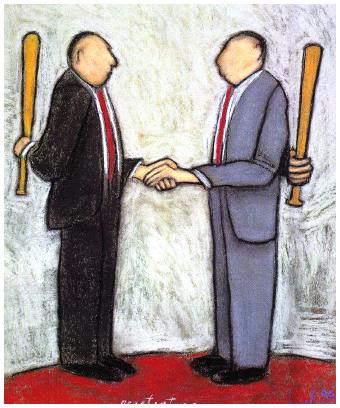Here’s How Persuasive You Are When You Swear
ry: This experiment examined the effects of judicious swearing on persuasion in a pro-attitudinal speech. Participants listened to one of three versions of a speech about lowering tuition that manipulated where the word “damn” appeared (beginning, end, or nowhere). The results showed that obscenity at the beginning or end of the speech significantly increased the persuasiveness of the speech and the perceived intensity of the speaker. Obscenity had no effect on speaker credibility. Source: "Indecent influence: The positive effects of…
1 min read
Is it true that “when you smile the whole world smiles with you”?
a manner of speaking, yes. By smiling we influence others to smile. People judge things more positively while smiling, so our own smile can set off a chain reaction causing more positive encounters. Via Choke: What the Secrets of the Brain Reveal About Getting It Right When You Have To: The researchers found a chameleon effect. When confederates rubbed their faces, so did the student, and when confederates shook their feet, the participant did the same thing. This was…
2 minutes
These Are The Two Most Common Tricks Advertisers Are Using To Manipulate You
bsp; 1) Your "feared self." Via Brandwashed: Tricks Companies Use to Manipulate Our Minds and Persuade Us to Buy: In a surprising 2008 study, researchers at the University of Bath, UK, found that the fear of failure drives consumers far more than the promise of success; the latter oddly tends to paralyze us, while the former spurs us on (and pries open our wallets). In fact, as the study found, the most powerful persuader of all was giving consumers a…
2 minutes
Your A to Z Guide To Influence, Persuasion and Negotiation
gotiating is an essential skill. Understand the seven pillars of effective influence. Believe that you can improve your negotiating skills and you can. Early on First impressions are an even bigger deal than you thought. A little spinning of the facts here can be a good thing. There is a home field advantage in negotiation. Even if you're not on home turf, making yourself at feel at home can give you some of that advantage. Be socially optimistic. Expect…
3 minutes
The Key To Being Liked And Being More Influential
e key to being liked and being more influential is similarity. You like names better when they are similar to yours. You even prefer brands that merely share your initials. Birthdays are easier to remember when they are closer to yours. You even prefer people who move the way you do. Demonstrating that you have something in common with someone else makes them more likely to help you. Salesmen deliberately fake little similarities in order to influence you and connect…
2 minutes
This Body Language Means You’re About To Be Cheated
a Wray Herbert, author of On Second Thought: Outsmarting Your Mind's Hard-Wired Habits: Then they isolated the specific cluster of cues that were actually present when volunteers successfully detected others’ self-serving intentions. Again and again, it was a cluster of four cues: hand touching, face touching, crossing arms, and leaning away. None of these cues foretold deceit by itself, but together they transformed into a highly accurate signal. And the more often the participants used this particular cluster of gestures,…
1 min read
Does email turn you into a jerk?
mmunicating via email (vs. face-to-face) makes people less cooperative and makes them feel more justified in being noncooperative: Two empirical studies are presented that explore how and why e-mail communication (versus face-to-face communication) influences cooperation in mixed motive group contexts. Results indicate that, relative to those engaging in face-to-face interaction, those who interacted via e-mail were (1) less cooperative and (2) felt more justified in being noncooperative. Feelings of justification mediated the relationship between communication media and the decision to…
1 min read
The Fast Way To Make Better Decisions, Backed By Research
ke the perspective of someone else. Think about what your smartest friend might do in that situation. We investigated how perspective-taking might be used to overcome bias and improve advice-based judgments. Decision makers often tend to underweight the opinions of others relative to their own, and thus fail to exploit the wisdom of others. We tested the idea that decision makers taking the perspective of another person engage a less egocentric mode of processing of advisory opinions and thereby improve their…
2 minutes








